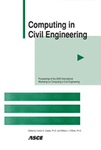Auto-Calibration of a Camera System Using Image-Alignment
Publication: Computing in Civil Engineering (2009)
Abstract
Calibration of a camera system is a necessary step in any stereo metric process. It correlates all cameras to a common coordinate system by measuring the intrinsic and extrinsic parameters of each camera. Currently, manual calibration of a camera system is the only way to achieve calibration in civil engineering operations that require stereo metric processes (photogrammetry, videogrammetry, vision based asset tracking, etc). This type of calibration however is time-consuming and labor-intensive. Furthermore, in civil engineering operations, camera systems are exposed to open, busy sites. In these conditions, the position of presumably stationary cameras can easily be changed due to external factors such as wind, vibrations or due to an unintentional push/touch from personnel on site. In such cases manual calibration must be repeated. In order to address this issue, several self-calibration algorithms have been proposed. These algorithms use Projective Geometry, Absolute Conic and Kruppa Equations and variations of these to produce processes that achieve calibration. However, most of these methods do not consider all constraints of a camera system such as camera intrinsic constraints, scene constraints, camera motion or varying camera intrinsic properties. This paper presents a novel method that takes all constraints into consideration to auto-calibrate cameras using an image alignment algorithm originally meant for vision based tracking. In this method, image frames are taken from cameras. These frames are used to calculate the fundamental matrix that gives epipolar constraints. Intrinsic and extrinsic properties of cameras are acquired from this calculation. Test results are presented in this paper with recommendations for further improvement.
Get full access to this chapter
View all available purchase options and get full access to this chapter.
Information & Authors
Information
Published In
Copyright
© 2009 American Society of Civil Engineers.
History
Published online: Apr 26, 2012
Authors
Metrics & Citations
Metrics
Citations
Download citation
If you have the appropriate software installed, you can download article citation data to the citation manager of your choice. Simply select your manager software from the list below and click Download.
